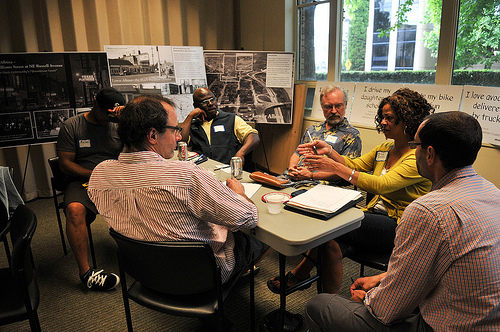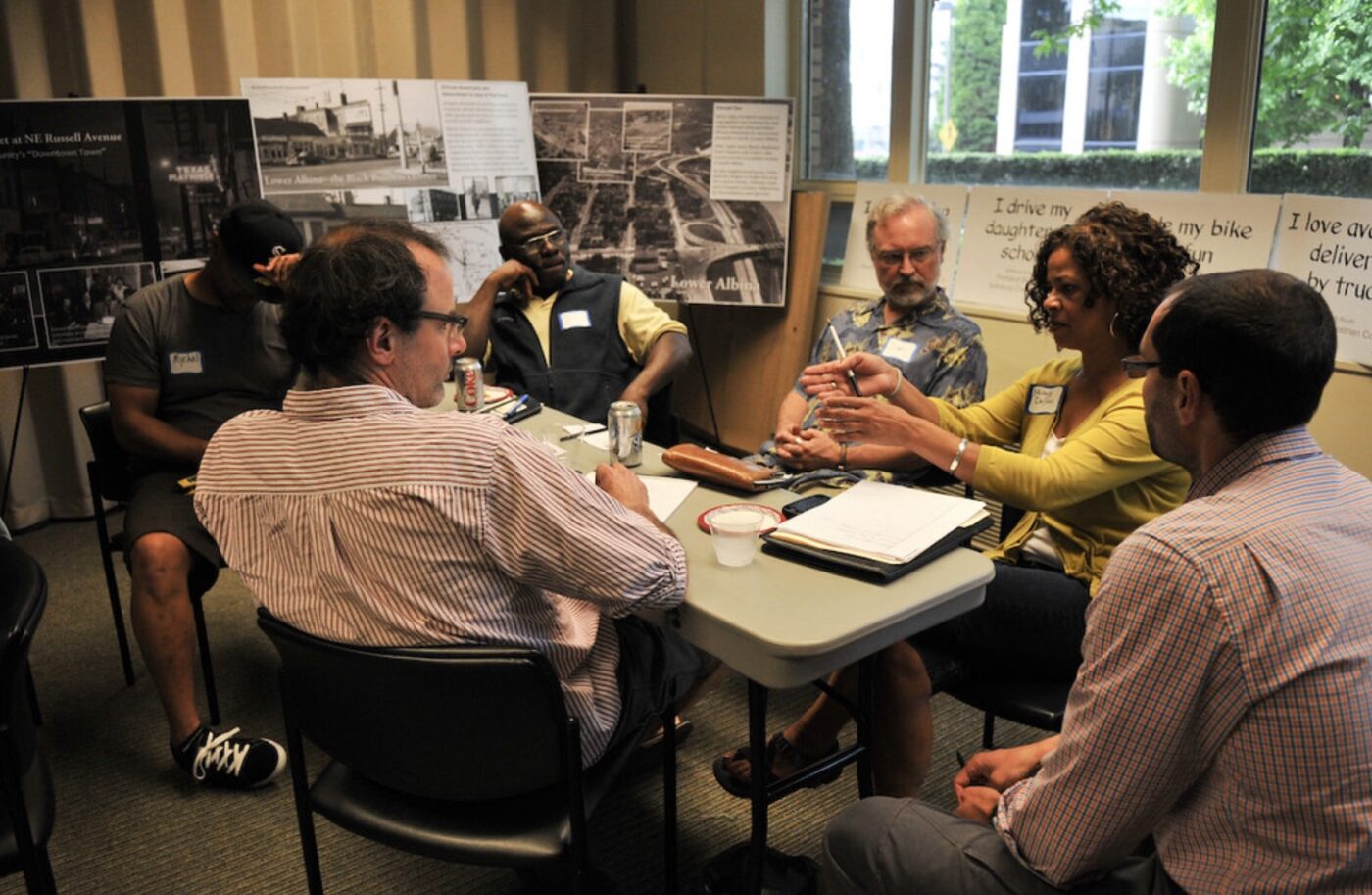
A meeting last night that was meant to discuss a new outreach campaign on N. Williams Avenue turned into a raw and emotional exchange between community members and project staff about racism and gentrification.
It was the first public meeting for the North Williams Traffic Safety Operations Project since the Bureau of Transportation decided to delay the project last June.
PBOT was on a path to remove one vehicle lane in order to create a wider bikeway; but some people in the community expressed concerns with the idea, on the grounds that the voices and input of black residents were not being adequately considered.
Lower Albina — the area of Portland just north and across the river from downtown through — was a thriving African-American community in the 1950s. Williams Avenue was at the heart of booming jazz clubs and home to a thriving black middle class. But history has not been kind to this area and through decades of institutional racism (through unfair development and lending practices), combined with the forces of gentrification, have led to a dramatic shift in the demographics of the neighborhood.
The history of the neighborhood surrounding Williams now looms large over this project.
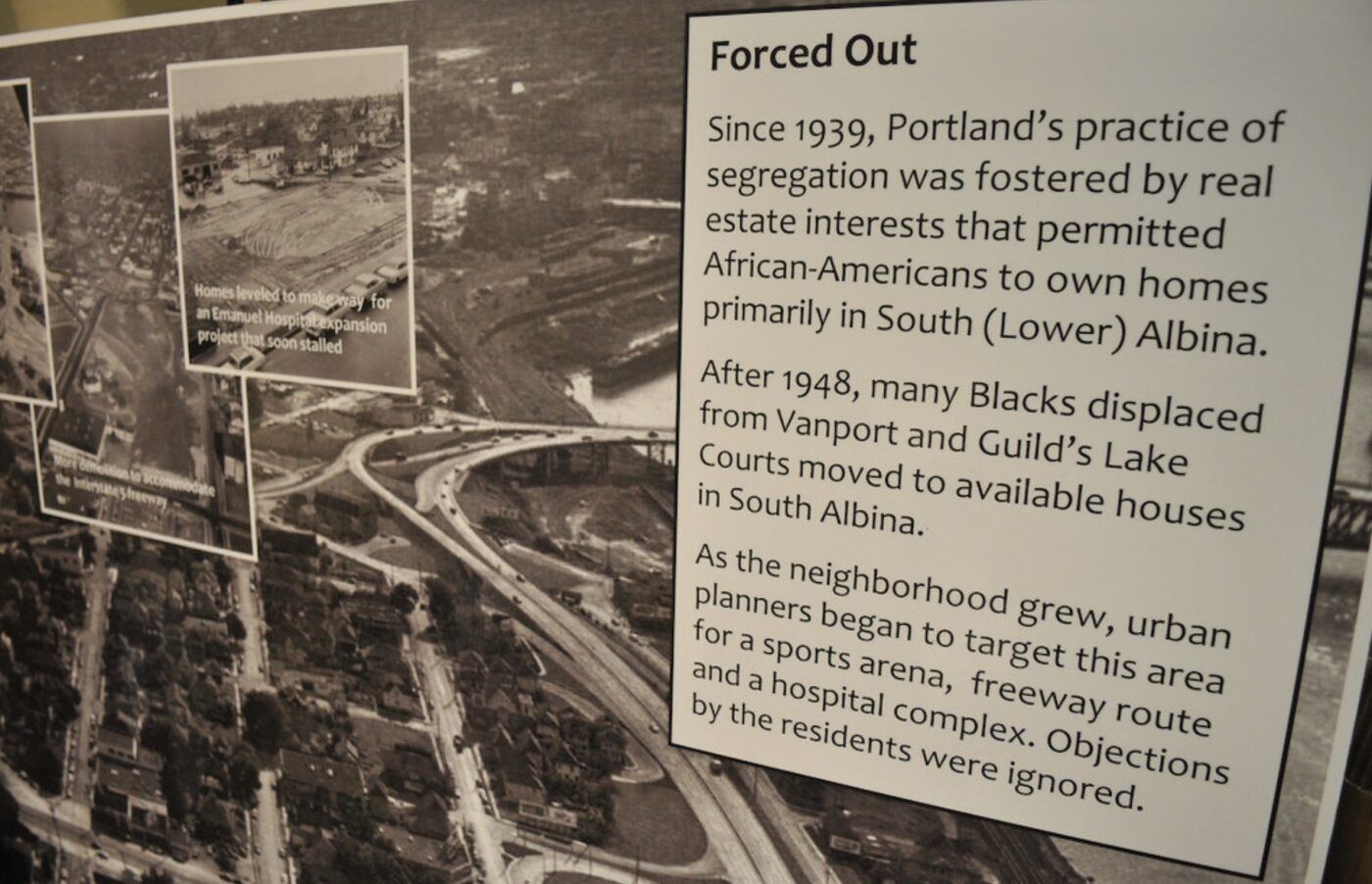
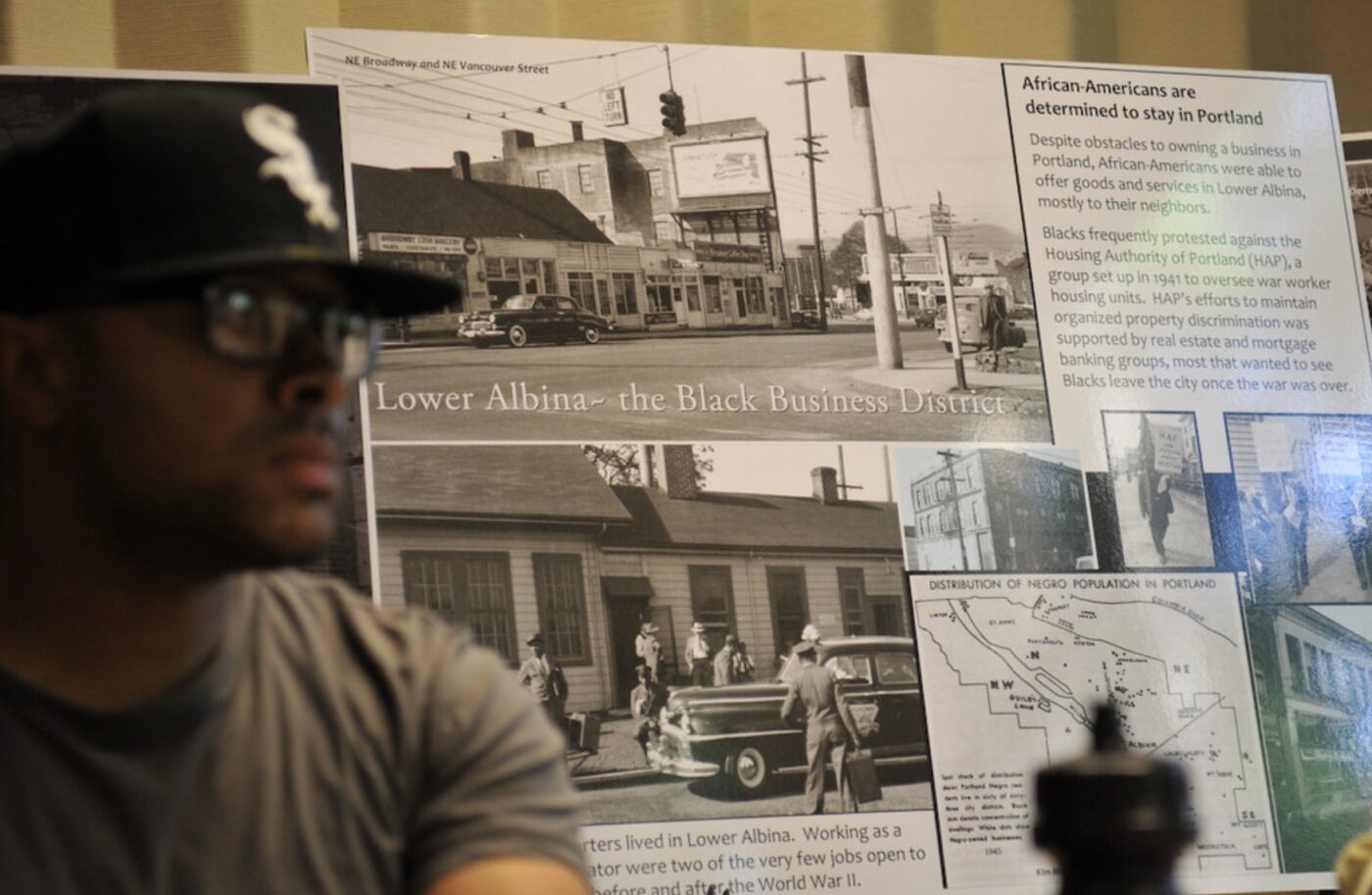
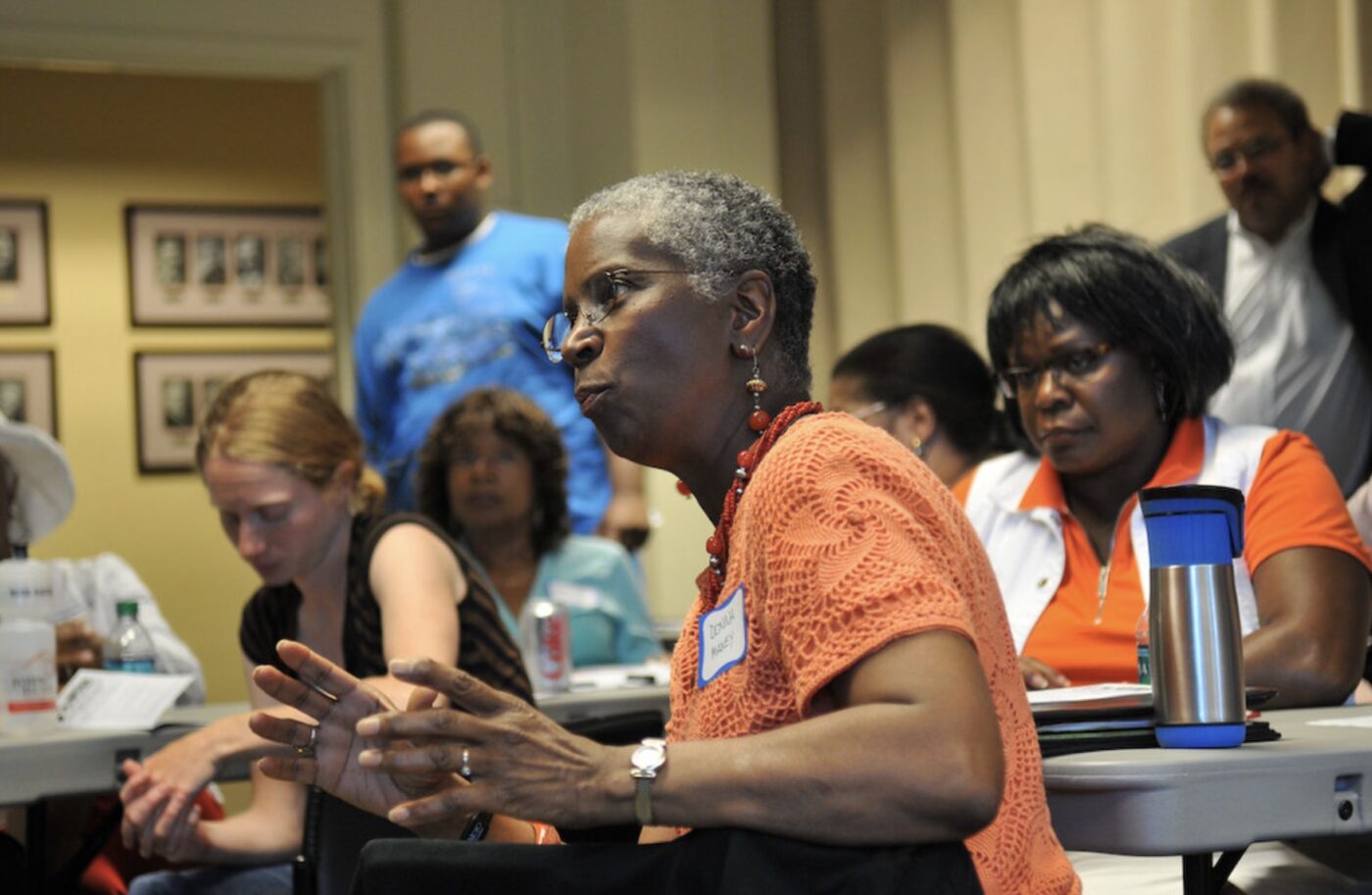

A brainstorming session was on the original agenda last night. Since engineering fixes are on hold until at least next summer, PBOT hoped to get input for an outreach campaign to promote “respectful traveling” on Williams. After about 30 minutes of group discussions and reports back to the full group, that discussion was derailed.
Michelle DePass, a woman who was born in the hospital where the meeting was taking place (Legacy Emanuel) and has lived in the area around N Williams all of her life, brought up the elephant in the room — racism.
Here’s what she said that dramatically changed the direction of last night’s meeting — and possibly the entire project:
“We have an issue of racism and of the history of this neighborhood. I think if we’re trying to skirt around that we’re not going to get very far. We really need to address some of the underlying, systemic issues that have happened over last 60 years. I’ve seen it happen from a front row seat in this neighborhood. It’s going to be very difficult to move forward and do a plan that suits all of these stakeholders until we address the history that has happened. Until we address that history and… the cultural differences we have in terms of respect, we are not going to move very far.”
Ms. DePass’s comments received applause from several other people at the meeting.
Donna Maxey, co-creator of Multnomah County’s Race Talks series, told PBOT staff that the project could be a golden opportunity to deal with an unjust history that has plagued Portland for decades:
“Before you can get into the racial issue, you have to get into the history. This has been going on since the ’20s here in Portland and so this is just a continuation of it. You can go ahead and move forward on this, or we can really come to grips with it and have an open discussion that makes Portland move forward in a different manner.
I mean, it’s been going on for 90 years, being pushed under the carpet. We’ve got to sit down and stop and talk; and maybe Williams ave is the vehicle to make that happen.”
“I honestly don’t understand how a safety campaign on Williams is an issue of gentrification or racism.”
“The fact that you don’t understand it means there are a lot of other people who ride up Williams that don’t get it.”
Michelle Poyourow, the consultant hired by PBOT to manage the public process, at first tried to stick to the agenda; but quickly realized the time had come for the race discussion.
One man, Jack Olsen, objected to throwing out the agenda, saying he came to the meeting to discuss a safety campaign. “I came here for a discussion of the safety issues,” Olsen said, timidly, “I’m worried I might offend people with this statement… but I honestly don’t understand how a safety campaign on Williams is an issue of gentrification or racism.”
Olsen’s question was met with shock by some people in attendance.
“The fact that you don’t understand it,” Ms. DePass responded, “means there are a lot of other people who ride up Williams that don’t get it.”
“I totally see these issues being integrated,” another woman replied, “It’s so integrated that it’s kind of disheartening to me to think that there are some folks in the room that really understand that and some folks who don’t. We need to have a basic, common understanding of what the history means and how it plays out in crosswalks and interactions between people.”
The woman (I failed to get her name), advocated for getting a group community leaders together to shape the project outcomes. “I think there’s a need to bring the African-American leadership forward to make sure that that voice is there in the outcome.” She then continued, “It’s sad to think that we have to protest to have our voices heard. We should be at the table making decisions about the outcomes.”
Another theme that emerged last night was a feeling among some people that the only reason safety is a major concern from the City now is because white people are the ones who are in danger.
Sharon Maxwell-Hendricks put it this way:
“You say you want it ‘safe’ for everybody, how come it wasn’t safe 10 years ago? That’s part of the whole racism thing… we wanted safe streets back then; but now that the bicyclists want to have safe streets than it’s all about the bicyclists getting safe streets.”
Donna Maxey told the story about her best friend in first Grade who was killed on Williams because of a lack of safety:
“What is causing the anger and resentment is that it’s only an issue of safety now that whites are the ones who are riding bicycles and walking on the streets. Because we have been in this community for years and it has not been an issue and now it’s an issue. So that’s the resentment you’re hearing… years of people being told, you don’t count, you don’t matter… but now that there’s a group of people who’s coming in that look like the people who are the power brokers — now it’s important. That’s the anger. That’s the hurt.”
Olsen, who asked the initial question about why race is connected to a safety project, then said,
“I can begin to comprehend why that resentment is there; but if we delay this safety campaign and project for a year, and in that time another first grader is hit and killed, I’d feel that it was a huge failure on our part as a community.”
Ms. Maxey responded by repeating earlier statements. When Olsen said he must not be explaining himself accurately, Maxey interjected with, “I understand what you’re saying, I’m just pissed.”
This was the kind of candid exchange that exemplified the meeting last night.
At this point, PBOT seems to be going with the flow of the discussion and has plans to continue this discussion at their next meeting on July 27th.
The project has touched a nerve for some in this North Portland community who have deep distrust of the City and anger borne from decades of institutional racism and ongoing struggles in the community.
There’s a lot more I have to say about his topic, but I wanted to get this recap of the meeting out so I’ll leave my other thoughts for another post. For now, listen to the OPB Think Out Loud show that aired this morning (I was a guest). There’s also a robust discussion about the issues going on in the comments from a story I posted yesterday.
CORRECTION: This story as initially published said that Donna Maxey was “an assistant professor in the Toulan School of Urban Studies and Planning at Portland State University.” I have since found out that Ms. Maxey is not currently on PSU’s faculty. I’ve edited the story and I regret the error. — Jonathan Maus
